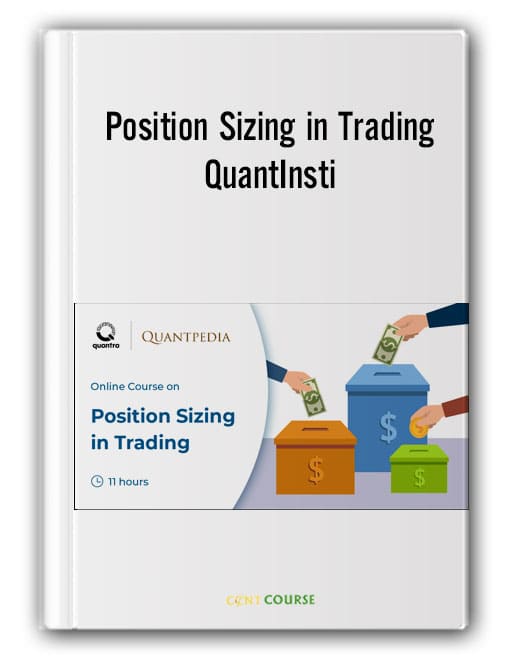Position Sizing in Trading – QuantInsti
$281.00 $35.00
Learn and apply position sizing techniques (Kelly, Optimal f, volatility targeting) to a trading strategy. Analyze their impact on performance. Study money management terms and inherent risks in financial markets. Create a conservative position sizing framework using all these learnings.
Course overview
Learn, create, implement and backtest various position sizing techniques such as Kelly, Optimal f, and volatility targeting on a trading strategy. Analyse how the performance of the strategy changes after applying these position sizing techniques. Also, learn money management terms and identify inherent risk in the financial markets. Incorporate all learnings in the course to create a conservative position sizing framework.
Apply Position Sizing Strategies
- Implement and backtest the position sizing methods such as Kelly, CPPI, TIPP, Volatility targeting, on a sample index reversal strategy.
- Explain the inherent risk in Kelly and Optimal F.
- Describe the need for money management and explain various money management terms.
- Paper trade and live trade using the position sizing techniques covered in the course.
- List and explain basic position sizing techniques such as fixed units, fixed sum, fixed fraction and fixed percentage.
- Plot the leverage and portion of capital used for each position sizing technique.
- Describe the hidden risks in financial markets such as non-stationarity and fat-tail distribution.
- Apply simulation methods such as Bootstrapping and Monte Carlo.
- Create a conservative framework for position sizing for calculating the capital to allocate.
Skills Required To Learn Position Sizing In Trading
Position Sizing & Simulation
- Methods
- CPPI & TIPP
- Volatility Targeting
- Kelly & Optimail F
- Bootstrapping & Monte Carlo
- Martingale
Python
- Pandas
- NumPy
- Matplotlib
- Loops
- Functions
Money Management Terms
- Drawdown & Volatility
- Trade Size
- Returns
- Win/Loss Ratio
- Trading System’s Expectancy
Learning Track 7
This course is a part of the Learning Track: Portfolio Management and Position Sizing using Quantitative Methods. Enroll to the entire track to enable 10% discount.
Prerequisites To Learn Position Sizing In Trading
To start with the course, you need to have a basic understanding of the financial market terminologies. We have used Python as a programming language to teach the concepts. However, Python is not a mandate to do this course. You can also apply the concepts in spreadsheets or any other programming language you are comfortable with.
Position Sizing In Trading Course
Introduction
What is Position Sizing and Money Management?
Position Sizing Terms
Trading Strategy
Implementation of the Trading Strategy
Basic Position Sizing: Fixed Units and Fixed Sum
Basic Position Sizing: Fixed Percentage and Fixed Fraction
Volatility Targeting
Application of Volatility Targeting
Live Trading on Blueshift
Live Trading Template
Constant Proportion Portfolio Insurance
Time Invariant Portfolio Protection
Kelly Formula
Optimal F
Theory Is Grey, but Life Is Green
Numerical Methods
Conservative Framework for Position Sizing
Automate Trading Strategy Using IBridgePy
Run Codes Locally on Your Machine
Capstone Project
Course Summary
About Author
Quantpedia is the encyclopedia/database of quantitative and algorithmic trading strategies. It helps users in processing fnancial academic research into a more user-friendly form to help anyone who seeks new quantitative trading strategy ideas.
Why Quantra ?
- Gain more in less time
- Get taught by practitioners
- Learn at your own pace
- Get data & strategy models to practice on your own
Related products
Finance and Trading
Finance and Trading
“Battle Tested” SPX 15-Day Calendar On-Demand Short Course – Sheridan Options Mentoring
Finance and Trading
Finance and Trading
Raghee Horner’s Workspace Bundle + Live Trading – Simpler Trading
Trading











